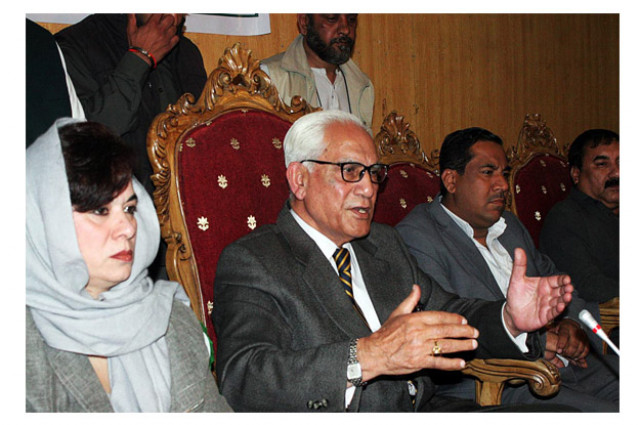High treason charges: Musharraf-led APML to challenge SC’s ruling
Ahmed Raza Kasuri says apex court should review its decision

APML leader Ahmed Raza Kasuri addressing a press conference at National Press Club. PHOTO: ONLINE
The Supreme Court’s three-judge bench on Friday accepted former chief justice Abdul Hameed Dogar’s appeal to exclude him from the investigation into the high treason case filed against Musharraf in 2013. The court had expressed its desire to start Musharraf’s trial without any unnecessary delay.
Addressing a press conference on Saturday, an APML leader Ahmed Raza Kasuri said he would file an appeal and challenge the decision next week.

“We will file an appeal and request the court to suspend the decision,” Kasuri said, adding that the apex court should review its decision as Musharraf did not impose emergency alone. “It was a collective decision taken by the cabinet members and the army,” he said.
Kasuri said the SC’s two sitting judges – Justice Asif Saeed Khosa and Justice Tariq Pervez – should not have heard the case as they were directly affected by November 2007 decision. He asked the government to withdraw the case.
In April 2014, the former army chief was formally charged with treason for imposing emergency. But the trial met a roadblock when the Special Court’s three-judge bench on November 21, 2014, asked the federal government to treat former CJP Dogar, former prime minister Shaukat Aziz and former law minister Zahid Hamid as co-accused.
After the passage of one year, the Islamabad High Court (IHC) set aside that order on the request of the three additional suspects. But on November 27, 2015, the special court once again asked the Federal Investigation Agency (FIA) to record the statements of all four men.
However, the apex court’s three-judge bench, headed by Justice Asif Saeed Khosa, on Friday observed a fresh investigation into high treason by associating any person lies within the prerogative of the federal government and not the special court or the IHC.
The bench had reproduced all the observations and declarations made by the SC and the Sindh High Court, holding Musharraf solely responsible for the November 3, 2007 actions. The 11-page judgment, authored by Justice Khosa, said the observations and declarations have already attained finality and they are in public domain. “Thus any reference to them in the present judgment may not be inappropriate,” it said.
Published in The Express Tribune, February 28th, 2016.



















COMMENTS
Comments are moderated and generally will be posted if they are on-topic and not abusive.
For more information, please see our Comments FAQ